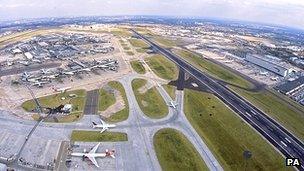CAA calls for increased airport capacity
- Published

The CAA says Heathrow consistently operates at up to 99% of potential
The UK economy will suffer if airport capacity in the south-east of England is not increased, according to the Civil Aviation Authority.
Without extra runway capacity, customers will face higher fares and reduced choice, said a CAA report.
The government said it was committed to developing "a sustainable policy framework for aviation".
But John Stewart of Hacan ClearSkies said capacity did not need to be increased but used differently.
The CAA report, external argues without expansion, UK airports may struggle to handle the growth in aviation demand boosted by emerging markets such as China, India and South America as well as recovery in the UK economy.
It said this was a strategic issue of national importance.
"Aviation should be able to grow, but to do so, it must be able to play its part in delivering our environmental goals and protecting quality of life of local communities," the report said.
CAA chief executive Andrew Haines said consumers and the UK economy would benefit from extra capacity "so long as it is delivered in an environmentally sustainable way".
"However, as we haven't built a single runway in the south east of England capable of handling Boeing 747s and Airbus A380s for over 70 years, the difficulty of increasing capacity is obvious," he added.
"The challenge facing the Government is to create an aviation policy that stands the test of time - not a policy for five years, but one for thirty years."
Fares hike
The report warned fares would increase because of lack of capacity, with consumers estimated to pay £1.7bn in fare premiums in 2030 or an extra £10 per passenger on a return flight.
The CAA also said the focus would be on the most profitable routes.
The CAA's report comes on the same day the government gave the go-ahead to a high-speed rail line between London and Birmingham.
And it comes almost two years after the government scrapped plans to build a third runway at Heathrow airport., external
In response to the CAA report, Aviation Minister Theresa Villiers said: "Our Draft Civil Aviation Bill published last year will reform the way our major airports are regulated by putting the passenger first and supporting investment in the improvements that matter most to passengers."
"The government has committed to develop a sustainable policy framework for aviation."
She said a public consultation on a draft policy framework would be issued in the spring.
But British Air Transport Association chief executive Simon Buck criticised the government for agreeing to the high-speed rail line when there are no airport expansion plans.
"The government appears eager to invest over £30bn in building new railway lines in grandiose showcase schemes, cutting huge swathes through the English countryside, but at the same time has vetoed airport expansion where it is desperately needed because they say the environmental cost is too high."
However, Mr Stewart said affordable high-speed rail could be a solution to the problem.
"There will be a need for more planes to come from the developing economies but the government should be looking at the number of short-haul flights in the south east, particularly Heathrow," he said.
"If passengers could be persuaded to use high-speed rail there would not be so many of those short-haul flights and those slots could be made available. If a rail journey is three-and-a-half hours or less, then people will switch to rail in fairly significant numbers, as long as it is affordable."
- Published10 January 2012
- Published14 December 2011
- Published21 November 2011
- Published23 October 2011
- Published18 October 2011
- Published22 September 2011